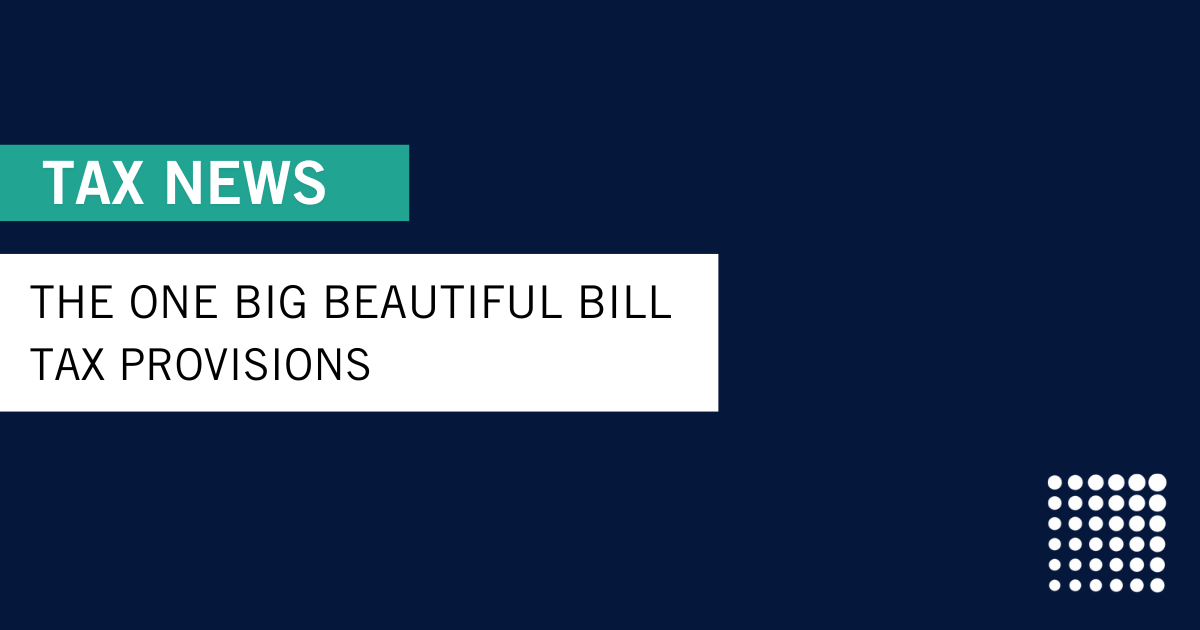Summary of the Business and Personal Tax Provisions
On July 4, 2025, President Trump signed The One Big Beautiful Bill Act (OBBB). This new legislation permanently extends and enhances many elements of the Tax Cuts and Jobs Act (TCJA). From boosted deduction for small businesses to increased estate exemption, the new bill offers significant tax-saving opportunities.
Although numerous provisions take effect for the tax year 2025, others depend on specific construction start dates, acquisition dates, or the date of enactment, making careful planning and timing particularly important.
The following is a high-level overview of the personal and business provisions that you will need to be aware of and consider. Please contact your CWA Advisor if you have any questions.
OBBB Business Tax Provisions
Section 179 (Sec. 70306)
- New Rule: Permanently increases Section 179 expense limit to $2,500,000 (up from $1,250,000) and the property threshold to $4,000,000 (previously $3,130,000) for tax years beginning after December 31, 2024 (adjusted for inflation after December 31, 2025).
- What it Means: For many small business owners in the dental space, this significantly reduces the likelihood of hitting the cap on new offices and buildouts.
Accelerated/Bonus Depreciation (Sec. 70301)
- New Rule: Permanently reinstates 100% bonus depreciation for property acquired and placed in service after January 19, 2025. This was previously capped at 40% in 2025, 20% in 2026, and 0% in 2027 and forward.
- What it Means: This provision, along with increased Section 179 benefits, further allows dental practice owners to reduce the cost of capital. The White House believes that restoring 100% expensing for qualified property will result in capital investment, modernization, productivity, and economic growth.
Qualified Business Income – QBI (Sec. 70105)
- New Rule: The Qualified Business Income (QBI) deduction of 20% is made permanent. Additionally, the phase-out range is increased to $75,000 (up from $50,000) to $150,000 (up from $100,000) for joint returns. This is effective for tax years beginning after 2025.
- What it Means: For many small business owners with S-Corporations, this increases the planning opportunity for taking profits via a W-2 versus a K-1 for additional tax savings.
Business Meals (Sec. 70305)
- New Rule: 100% deduction for business meals provided at the convenience of the employer.
- What it Means: Starts in 2026.
Pass-Through Entity tax (PTE)
- New Rule: No change.
OBBB Personal Tax Provisions
Estate Limitations (Sec. 70106)
- New Rule: Beginning in 2026, the federal estate, gift, and generation-skipping transfer (GST) exemption will be permanently increased to $15M per individual and $30M for married couples. There will also be an inflation adjustment annually starting in 2027.
- What it Means: There will be no sunset in 2026, which provides greater opportunities for wealth transfer without incurring federal estate or GST tax. However, this change does not affect estate taxes at the state level. It is still important to understand whether your state imposes its own estate tax. Additionally, future legislation could reduce the current high exemption amount, so proper planning remains essential.
Tax Brackets (Sec. 70101)
- New Rule: Permanently extends the current tax brackets at 10%, 12%, 22%, 24%, 32%, 35%, and 37% for years after 2025.
- What it Means: Tax bracket management continues to be important for ROTH conversion planning. Continue to look for opportunities to take advantage of 0% capital gains rates for lower income brackets.
Standard Deduction (Sec. 70102)
- New Rule: Permanent increase to the standard deduction. For the 2025 Tax Year: single & married filing separately (MFS is $15,750; married filing jointly (MFJ) is $31,500; and head of household (HOH) is $23,625. Amounts are to be indexed for inflation going forward.
- What it Means: The permanence of the increased standard deduction could mean that fewer taxpayers may benefit from itemizing their deductions.
Social Security (Sec. 70103)
- New Rule: For each taxpayer over 65 years old, an additional $6,000 bonus deduction (above the line) is allowed ($12,000 total for MFJ if both spouses are over 65). This bonus deduction is phased out at higher income levels ($75K – $175K for single, and $150K – $250K for MFJ). The phaseout is calculated as 6% of modified adjusted gross income (MAGI) above $75K or $150K. This additional $6,000 bonus deduction is currently only in effect for tax years 2025 – 2028.
- What it Means: The White House estimates that this will greatly reduce or eliminate taxes due on Social Security benefits for 88% of taxpayers.
Child Tax Credit (Sec. 70104)
- New Rule: The taxpayer and qualified child must have a SSN to claim this credit. The amount of Child Tax Credit is now $2,200 and will be indexed for inflation. Phaseouts of $200K and $400K were made permanent.
- What it Means: The permanent increase of $2,200 per child allows for $1,700 as a ‘refundable’ credit, and it is indexed for inflation.
Interest on Autos (Sec 70203)
- New Rule: Allows an above-the-line deduction for up to $10K of interest on new car loans for 2025-2028. The auto must be a U.S.-assembled passenger vehicle, and the vehicle must secure the loan. The $10K limit applies per tax return. Lease financing does not qualify. Phaseouts at MAGI over $200K for MFJ and $100K for single filers. The Vehicle Identification Number (VIN) must be reported on the return.
- What it Means: This is set to expire in 2028. Consider the timing and type of vehicle you purchase. The deduction is available regardless of whether you itemize or not (above the line).
State and Local Tax (SALT) Cap (Sec. 70120)
- New Rule: Increases the SALT deduction from $10K up to $40K in 2025 for MFJ ($20K for MFS). It will increase to $40,400 in 2026 and then rise by 1% annually starting in 2027. However, the SALT Cap deduction reverts to $10K in 2030. Phaseouts are 30% of excess MAGI over $500K MFJ ($250K single), $505K in 2026, and a 1% increase each year beginning in 2027. Phaseout cannot be reduced below $10K.
- What it Means: This will be greatly beneficial for taxpayers in states with higher state income taxes (CA, NY, etc.). Consider bunching deductions and timing payments.
Home Mortgage Interest Deduction (Sec. 70108)
- New Rule: Mortgage interest deductions are now permanently limited to $750K of mortgage debt (MFJ, Single), $375K (MFS) for homes purchased after 2017. Additionally, this allows mortgage insurance premiums to be an itemized deduction beginning in 2026.
- What it Means: This shifts the tax benefits to new and middle-class homeowners in an expensive housing market as they now have the ability to itemize their deductions with the inclusion of the mortgage insurance premium.
Home Equity Debt (Sec. 70108)
- New Rule: Home equity loans that are NOT used for buying, building or substantially improving a home are now permanently non-deductible.
- What it Means: Home equity loans used for paying off personal debt, etc., will no longer be able to deduct the interest paid.
Charitable Deduction Limits – Standard Filers (Sec. 70424)
- New Rule: Allows charitable contributions of up to $2,000 (MFJ) or $1,000 (single & MFS) to be deductible for filers who do not itemize deductions beginning in tax year 2026.
- What it Means: Charitable contribution deductions are now available to all taxpayers, regardless of whether you itemize or not.
Charitable Deduction Limits – Itemized Filers (Sec. 70425)
- New Rule: Charitable contributions will only be deductible when made more than .5% of the taxpayer’s adjusted gross income through the itemized deduction schedule. Disallowed contributions may only be carried forward if they exceed the contribution limit. The 60% cash contribution limit is permanently extended.
- What it Means: Consider AGI when determining charitable contributions tax effect. Anything below .5% of AGI will not be deductible.
Student Loans (Currently in Repayment)
- New Rule: The PAYE and SAVE plan will be eliminated by July 1, 2028.
- What it Means: Borrowers on PAYE will automatically be transitioned to the Old IBR plan. Borrowers on SAVE will automatically transition to either the Old IBR or New IBR, depending on borrowing dates. Borrowers will have the option to transition to either the new RAP plan or the Graduated Step-Up plan.
Student Loans (For New Borrowers)
New borrowers will have two primary repayment options: the New Standard Repayment Plan and the New RAP plan.
- The New Standard Repayment Plan
What it Means: Repayment terms will now be based on your total loan amount:
- Under $25,000: 10 years
- $25,000 – $49,999: 15 years
- $50,000 – $99,999: 20 years
- $100,000 or more: 25 years
2. The New RAP Plan
What it Means: Designed to be an income-based system where payments are a percentage of a borrower’s total AGI. Any interest that accrues beyond your monthly payment is subsidized (like under the SAVE plan).
- Income $0–$10,000/year: Flat $10/month minimum payment (no $0 payments allowed).
- $10,000–$20,000/year: 1% of your AGI annually (÷12, minus $50/month per dependent child).
- $20,000–$30,000/year: 2% of AGI (same formula).
- $30,000–$40,000/year: 3% of AGI.
- Increase 1% for every additional $10,000 in AGI, capped at 10% for incomes above $100,000.
Student Loans (For Future Borrowers)
- New Rule: There will now be lifetime limits on borrowing
- What it Means: Total Combined Limit: $257,000
- Specific Program Caps:
- Undergraduate: $50,000
- General Professional Master’s (e.g., MBA, MA, MS): $100,000
- Professional Graduate (e.g., MD, JD, DVM): $200,000
Details of the provisions and the planning required to maximize them are evolving. Trust that your CWA Planning and Tax teams are here to help. Contact your CWA advisor with questions.
Not a client? Contact a member of our team to see how we are helping our clients leverage tax efficiencies to reach their short- and long-term financial goals.














